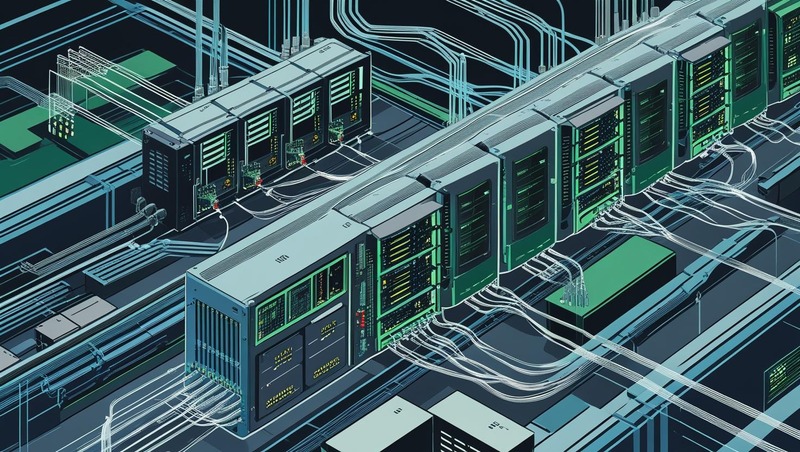The industrial data management market is undergoing a transformative shift, driven by advancements in digital technologies, the increasing adoption of Industry 4.0 principles, and the rising demand for actionable insights from complex industrial environments. By 2030, the market is expected to evolve significantly, offering smarter, faster, and more integrated solutions to address the growing data complexity in manufacturing, energy, oil & gas, transportation, and other industrial sectors. This evolution will not only reshape how companies collect, store, and analyze data but also how they use it to make strategic decisions, improve efficiency, and maintain competitiveness in a fast-changing global landscape.
The convergence of technologies such as artificial intelligence, machine learning, edge computing, and the Industrial Internet of Things (IIoT) is playing a central role in reshaping the data management landscape. Traditional data silos and manual data processing methods are becoming obsolete as industrial organizations move toward real-time data collection and advanced analytics. By 2030, data platforms will offer more automation, intelligent indexing, and contextualization capabilities, making data more accessible and usable across all levels of the organization. Predictive analytics and prescriptive insights will become the norm, allowing companies to anticipate failures, optimize resource usage, and proactively address production bottlenecks.
Download PDF Brochure @ https://www.marketsandmarkets.com/pdfdownloadNew.asp?id=150678178

Cloud-based data management systems will see exponential growth as businesses seek scalable, secure, and cost-effective ways to manage increasing volumes of industrial data. Hybrid and multi-cloud environments will become standard, enabling seamless data integration across distributed assets, remote facilities, and global operations. Cloud platforms will offer end-to-end data lifecycle management—from ingestion and storage to analytics and visualization—all while ensuring high availability and regulatory compliance. This cloud-first approach will also democratize data access, empowering different departments and stakeholders to derive insights without depending heavily on IT teams.
Cybersecurity and data governance will take center stage as the volume, velocity, and variety of industrial data continue to grow. Companies will need to ensure that their data management platforms can handle sensitive and mission-critical information with the highest levels of integrity and security. By 2030, robust governance frameworks will be embedded into industrial data systems, enabling better control over data lineage, access rights, and compliance with international standards such as GDPR, ISO/IEC 27001, and sector-specific regulations. As a result, trust in data will improve, and organizations will be more confident in making data-driven decisions.
Interoperability and standardization will become key enablers for seamless industrial data exchange. The proliferation of connected devices and sensors across industrial environments will necessitate unified data models and standardized communication protocols. By 2030, open platforms and cross-industry collaborations will foster a more interconnected data ecosystem, where information can flow freely between machines, systems, and enterprises. This will reduce integration costs, accelerate innovation, and unlock new opportunities for digital twin technology, simulation models, and real-time operational optimization.
Human-machine collaboration will also play a pivotal role in the future of industrial data management. With the rise of user-friendly dashboards, natural language interfaces, and AI-powered assistants, employees at all levels—whether on the shop floor or in executive offices—will be able to interact with data more intuitively. Augmented analytics tools will highlight patterns and recommend actions, helping human workers make more informed decisions in less time. This synergy will enhance workforce productivity and open the door to continuous improvement initiatives powered by real-time data feedback loops.
The competitive landscape of the industrial data management market will intensify as both established players and innovative startups race to offer differentiated, AI-infused, and domain-specific solutions. Strategic partnerships, mergers, and acquisitions will be common as companies strive to expand their capabilities and customer base. By 2030, the market will see the emergence of industry-focused data management suites that are tailored to specific verticals such as manufacturing, oil & gas, utilities, and pharmaceuticals. These solutions will integrate deeply with operational technologies (OT), enterprise resource planning (ERP), and supply chain management systems to provide a unified view of business performance.
Frequently Asked Questions (FAQs) on the Industrial Data Management Market
- What is industrial data management?
Industrial data management involves the systematic collection, storage, analysis, and utilization of data generated across industrial operations to enhance decision-making, operational efficiency, compliance, and predictive maintenance. - Why is industrial data management important?
It is crucial for improving productivity, ensuring data integrity, enabling real-time monitoring, supporting digital transformation, and achieving better asset performance and regulatory compliance in industrial settings. - What are the key technologies driving the industrial data management market?
Key technologies include Industrial Internet of Things (IIoT), cloud computing, artificial intelligence (AI), edge computing, data lakes, and advanced analytics platforms that help manage vast amounts of operational data effectively. - Which industries benefit most from industrial data management solutions?
Industries such as manufacturing, oil & gas, energy & utilities, chemicals, pharmaceuticals, and automotive benefit greatly due to their high reliance on accurate, timely, and integrated data for performance and safety. - What challenges does the industrial data management market face?
Major challenges include data silos, integration of legacy systems, cybersecurity risks, high implementation costs, and a lack of skilled professionals for managing and interpreting industrial data.
See The Latest Semiconductor Reports:
Embodied AI Market by Product Type [Robots (Humanoid Robots, Mobile Robots, Industrial Robots, Service Robots, Cobots), Exoskeletons, Autonomous Systems, Smart Appliances], Level of Embodiment (Level 1, Level 2, Level 3) – Global Forecast to 2030
Photovoltaics Market by Material (Silicon, CIGS, CdTe, Perovskite, Organic Photovoltaic, Quantum Dot), Component (Modules, Inverters, BOS), Installation Type (Ground-mounted, Building-integrated, Floating), Cell Type and Region – Global Forecast to 2030
